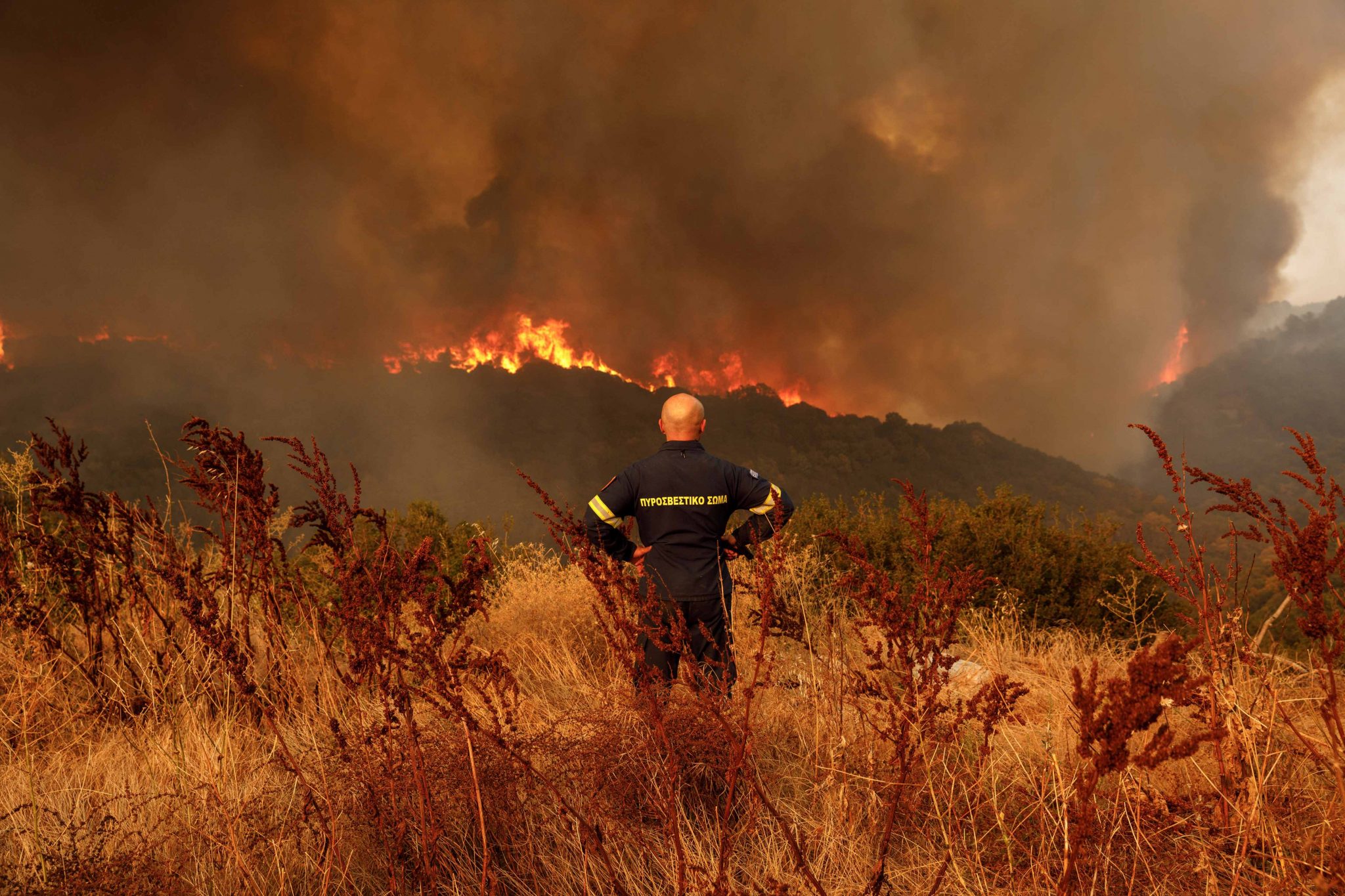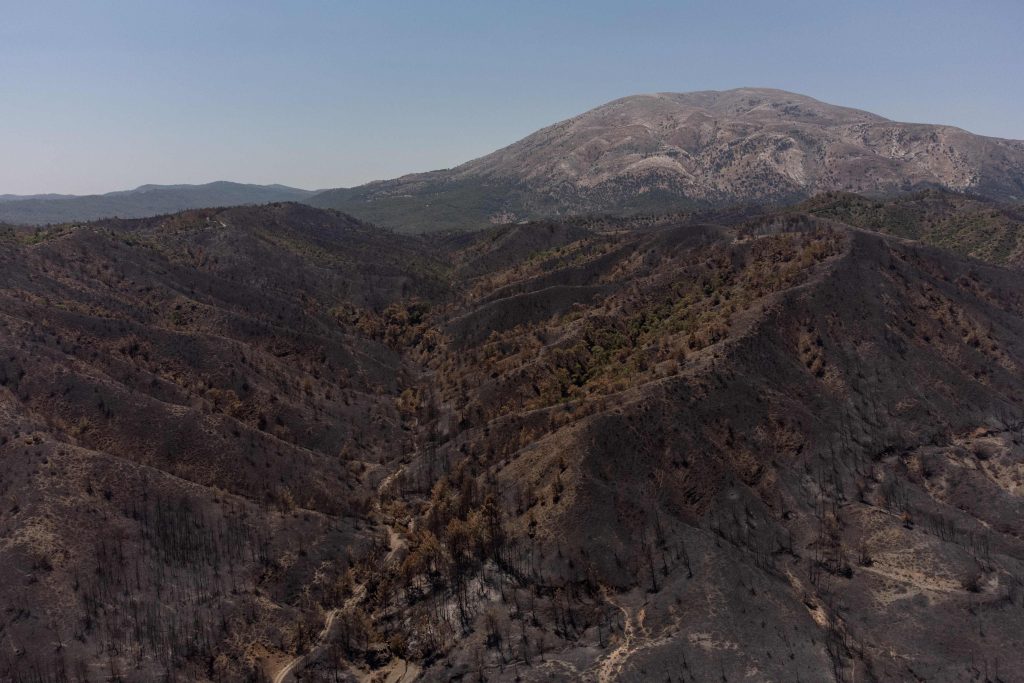
Last year, over half a million (504,002) hectares, an area twice the size of Luxembourg, was scorched by wildfires, according to an advance report on Forest Fires in Europe, Middle East and North Africa 2023 published today by the Commission’s Joint Research Centre (JRC).
The report shows that fires intensified during summer 2023, affecting mostly the Mediterranean region, with Greece (near Alexandroupoli) suffering the largest single fire to occur in Europe since the 1980s. Climate change is making wildfires more and more frequent. And it will get worse, as the European Climate Risk assessment report published in March highlights. Wildfires are increasingly affecting areas that have not been considered fire-prone regions in the past.

EIRIF forest firefighters work during the extinction of the Tijarafe fire on the Canary Island of La Palma, Spain July 16, 2023 REUTERS/Borja Suarez
In addition, preliminary data for the first three months of 2024 show almost double the average number of fires, although these did not have major impact in terms of burnt areas.

General shots of the destruction caused by the extensive wildfires in Southern Rhodes, Asklipio village, on August 5, 2023
Analysis by vegetation type for 2023 reveals that 37% of the total burnt area was covered by shrubs and sclerophyll vegetation, characterised by hard, thick leaves and adapted to prolonged periods of dryness, while 26% (120,000 ha) were forests. According to the report, the wildfires resulted in severe damage to the environment, producing some 20 megatonnes (Mt) of CO2 emissions, equivalent to nearly a third of all emissions from international aviation in the EU in one year. The three worst years in this century by the extent of burnt area mapped by the European Forest Fire Information System (EFFIS) were 2017 (988427 ha), 2022 (837212 ha) and 2007 (588388 ha). The final 2023 report, integrating national contributions, is due to be published in the autumn.
The Commission published in March 2024 a Communication on building climate resilience in the EU and effectively managing climate risks. As part of immediate action, the measures call for enhanced prevention including nature-based solutions, better preparedness thanks to early warning systems and efficient firefighting means made available through the EU Civil Protection Mechanism (UCPM).
Source: tovima.com
Latest News

PM Mitsotakis to Chair New Democracy’s Committee Meeting
Today’s meeting is seen as a crucial opportunity to halt internal disputes within ND and reaffirm unity within the party.

Trump Tariffs Jeopardize Growth: Piraeus Chamber of Commerce
The tariffs, aimed at reducing the U.S. trade deficit, are expected to have both direct and indirect effects on the European economy

EU Condemns Trump Tariffs, Prepares to Retaliate
As tensions escalate, the EU is expected to continue negotiations with Washington while preparing for potential economic retaliation.

The Likely Impact of Trump Tariffs on Europe and Greece
Trump tariffs are expected to negatively affect economic growth in the Eurozone while Greece's exports could take a hit.

Motor Oil Results for 2024: Adjusted EBITDA of 995 mln€; Proposed Dividend of 1.4€ Per Share
Adjusted EBITDA for 2024 was down 33% yoy. The adjusted profit after tax for 2024 stood at 504 million euros, a 43% decrease from the previous year

Cost of Living: Why Greece’s 3% Inflation Is Raising Alarm
Greece appears to be in a more difficult position when it comes to price hikes, just as we enter the era of Trump’s tariffs.

Fitch Ratings Upgrades the Four Greek Systemic Banks
NBG’s upgrade reflects the bank’s ongoing improvements in its credit profile, Fitch notes in its report, including strong profitability, a reduction in non-performing exposures (NPEs), and lower credit losses

Trump to Announce Sweeping New Tariffs Wednesday, Global Retaliation Expected
With Trump's announcement just hours away, markets, businesses, and foreign governments are bracing for the fallout of one of the most aggressive shifts in U.S. trade policy in decades.

Inflation in Greece at 3.1% in March, Eurostat Reports
Average inflation in the eurozone settled at 2.2%, compared to 2.3% in February

Greece’s Unemployment Rate Drops to 8.6% in February
Despite the overall decline, unemployment remains higher among women and young people.
























![ΕΛΣΤΑΤ: Αυξήθηκε η οικοδομική δραστηριότητα κατά 15,6% το Δεκέμβριο [πίνακες]](https://www.ot.gr/wp-content/uploads/2025/03/DSC9655-2-1024x569-1-90x90.jpg)

![Δασμοί Τραμπ: Οι επιπτώσεις στις ελληνικές εξαγωγές και στην ευρωπαϊκή οικονομία [γραφήματα]](https://www.ot.gr/wp-content/uploads/2023/10/ot_exagog_ISRAEL-600x352.png)















 Αριθμός Πιστοποίησης
Αριθμός Πιστοποίησης